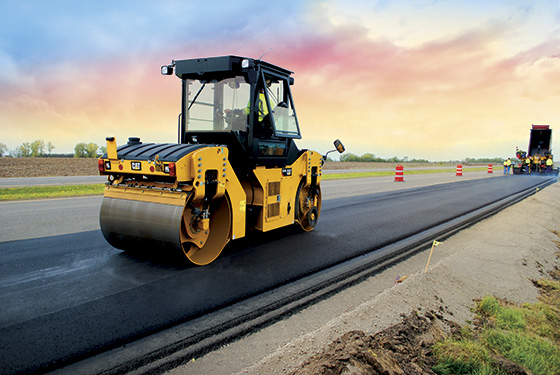Waiting

National market of road works did not take off yet, postponing in a year most projections of compactor sales
Once more, road paving hit the post. As occurred in 2013, many of the announced projects did not come out of the paper. In counterpart, two large concessions (BR-163 and BR-040) encouraged market agents and were able to create a scenario of distinct and even contradictory evaluations about the real advancement of the works in this area.
Ciber—that sells the brand Hamm in Brazil—estimates a reduction of 15 percent in relation to 2013. Caterpillar thinks that the year was “interesting and of growth” for paving but did not inform percents. As a more comprehensive reference, the Sobratema Study of Brazilian Market of Construction Equipment detected an increase of 13 percent in this market. According to this survey, 2150 units were sold last year.
There are no projections for 2015, but the interviewed people is waiting a year “in the same level or a little worse”, as says Luiz Lemos, business manager of Atlas Copco for the paving line. Adding more details, the Caterpillar delegate for paving in Brazil, Paulo Roese, remembers that the analysts expect an inflation of 6.5 percent and foresee a drop in the estimative of GDP increase, projecting only 0.73 percent. “The exchange rate expected for the end of 2015 is R$ 2,70 and the Selic tax will probably close in 12.5 percent”, says him. “In addition, there is all the political turbulence that is affecting the contractors right now, stopping the works.”
Sharing this evaluation, Lemos points out that almost everything that needed to be done in Brazilian road infrastructure kept dammed. “We see the result of this policy even in manufacturers’ schedules, calculated for the market of 2010, when we sold a thousand units”, continues him. “This volume was falling down along the time and now we work with a production of 600 to 700 machines per year.”
TRENDS
Even in this scenario, industry does not stop. For Lemos, the positive point of the shy advancement of the market during the last years was that Brazil continues to be a huge market for road works, not only for paving and construction but also for road maintenance. Therefore, Atlas Copco (as well as the other manufacturers) continues to go ahead technically and to trace trends of consumption and use of compactors, always trying to increase its market share.
Volvo CE, for example, bets in an increase of equipment with cabin. According to the road equipment manager of the company, Babliton Cardoso, 95 percent of equipment for soil compaction of the brand have currently cabin with air conditioning and ROPS/FOPS protection. “In asphalt rollers there is a larger demand for models without cabin. In this case, the argument is that there is no asphalt compaction when it is raining and also that works in urban areas using equipment without cabin are safer since they ensure more visibility to the operator”, says him. “But this is also changing because other machines of the yellow line that also work in urban areas—such as backhoes, excavators, etc.—have cabin and are not less safer for this reason.”
In operational attendances to Vale, Petrobras and some of the largest contractors of the country, machines without cabin are not allowed, a fact that is also powering this evolution, according to Cardoso.
In fact, for the business manager of Ciber, Paulo Rogério Veiga Silva, the use of rollers with cabin is more related to an increase of demand by the clients than to a standard or market definition. And the remaining resistance, according to him, occurs just because “the model with cabin costs approximately 15 percent more than that without cabin”.
But there are also legal issues. Roese, from Caterpillar, points out that the NR-18—that is being revised in terms of safety standards for the construction industry—establishes the inclusion of ROPS/FOPS structures and the obligation of closed cabins with air conditioning for almost the entire yellow line and for paving equipment. The exceptions, due to its application, would be road milling machines and asphalt pavers. At that time, the market of compactors will be quite hit, “leading to a fleet mainly equipped with cabin in a few years”.

Av. Francisco Matarazzo, 404 Cj. 701/703 Água Branca - CEP 05001-000 São Paulo/SP
Telefone (11) 3662-4159
© Sobratema. A reprodução do conteúdo total ou parcial é autorizada, desde que citada a fonte. Política de privacidade














